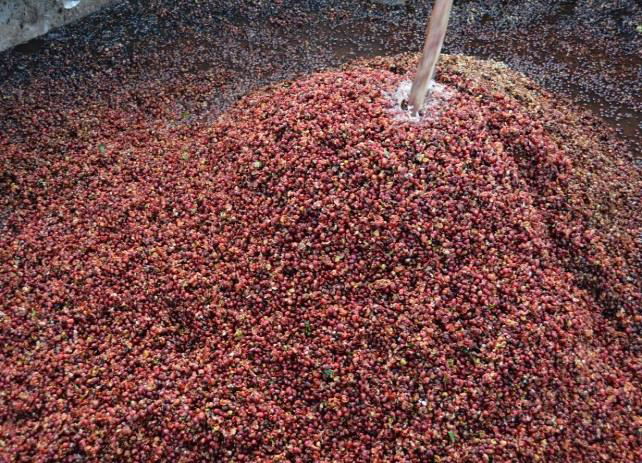What about the shelf life of coffee beans? how to maintain the flavor characteristics of fine coffee?
For professional baristas, please follow the coffee workshop (Wechat official account cafe_style)
I always think that the baking date is one of the most important information on the coffee bag. He can prove that the coffee in the bag is special and one of the best selling points of the product. Therefore, I think the baking date is an oath to let customers know that the coffee in the bag is fresh and good, and to assure them of the quality of the raw beans I have chosen. They trust that the beans I bake for them are already very special beans. My job is to stimulate the potential of the beans themselves without excessive influence.
As a baker, I struggled with the concept of added value for some time, but isn't that my job? I inspire the potential of the beans themselves, adding the value gained from the taste of raw coffee beans, that is, roasting, just as the processing field adds value to coffee cherries, and the Spanish beneficio (meaning benefit) of the washing plant is the same concept that gives coffee an advantage. But can you make coffee competitive by providing coffee information? For example, we provide farm information, growing areas, elevations and varieties, some knowledge in the field of boutique coffee may be helpful, and sharing these details can also create a broader blueprint for customers.
On the other hand, will there be some information that we excessively publicize or even take out of context, using inappropriate terms to try to add value to coffee? It's like when we mention the "seasonality" of coffee.
Some people know very well that I am very interested in the word seasonality on raw beans. I certainly think that raw beans have their lifespan, and whenever I get new beans, I am always happy, but the word seasonality can not be properly used to add the value of raw beans. I am worried that inadvertently spreading this concept will affect professionals' participation in the production of other handicrafts and consumers' views on the boutique coffee industry. If coffee beans have lost their speciality and can no longer provide a cup of sweet coffee, shouldn't we sell them to our guests, whether they are seasonal beans or not? isn't that part of the oath?
In addition, are we overly trying to convince customers what a good cup of coffee should taste like? When we learn what a good cup of coffee is, we do a great job and reflect it by our favorite coffee characteristics, but we don't know enough about coffee, which is also reflected in our customers' preference for coffee. Letting customers know everything about the quality of coffee is tiring or interesting, depending on what you expect of them. Since your customers are not professionals in the coffee industry, you don't have much time to learn how altitude affects coffee quality, or why a cup of bright coffee rich in citric acid is actually quite popular.
Perhaps the most direct way to teach customers about the quality of coffee and how different grades of coffee taste is to let them understand why a cup of coffee is not good, and to identify the tastes and characteristics, speaking of myself, quite familiar with the taste characteristics of coffee beans that have lost a lot of organic matter, that is, the so-called old beans and old beans, the characteristics in the cup are almost impossible to ignore. If customers understand these points, will they no longer need to mark coffee beans in season or out of season? Or does the baker need to be responsible for these gatekeepers in order to establish a relationship of trust with customers?
For the field of boutique coffee, the shelf life of both raw and roasted beans needs to be carefully understood and its acceptable characteristics need to be identified. I strongly believe that the difference between high-quality raw beans and raw beans that have lost a lot of organic matter, fresh baked beans and stale baked beans is a key to determine the advantage of fine coffee.
We can still regard the baking date as one of the most important information on the coffee bag and help customers understand the quality of the products they are about to buy, which is the most direct added value I can provide.

Important Notice :
前街咖啡 FrontStreet Coffee has moved to new addredd:
FrontStreet Coffee Address: 315,Donghua East Road,GuangZhou
Tel:020 38364473
- Prev

Professional coffee brewing: coffee extraction time, steaming time, best brewing data
Communication of professional baristas Please follow the coffee workshop (Wechat official account cafe_style) in order to enjoy delicious coffee, it is important to observe the extraction time suitable for coffee brewing. Let's look at the basics of how to make the extraction time of hand-brewed coffee at this time. Learning the best extraction time it is said that from the time of brewing coffee powder, the best extraction time for making coffee
- Next

Wikipedia says about the standard of espresso. What kind of espresso tastes good?
Professional baristas please pay attention to the coffee workshop (Wechat official account cafe_style) Italian coffee (Espresso) is a beverage made by forcing near-boiling high-pressure water through coffee ground into fine powder. Espresso coffee is generally thicker than other methods and contains higher concentrations of suspended solids and dissolved solids, such as coffee fat on the surface.
Related
- What is the meaning of lactic acid fermentation with coffee bean treatment?
- How to judge the state of foam by sound?
- How does the latte pull out the unicorn pattern? Come to get for a little trick to improve the flower pull!
- Will flower pulling affect the taste of the latte?
- Do you know the history of coffee?
- The difference between honey treatment and sun washing what is raisin honey treatment?
- What kind of milk can a novice use to make coffee foam to keep the foam longer? The correct method and skills of milking tutorial sharing
- Why do washed coffee beans taste sour? Flavor characteristics of washed Coffee
- Introduction to the skill of how to practice the size and height of water injection around the circle of hand-brewed coffee
- How do beginners practice coffee flower drawing from scratch?

